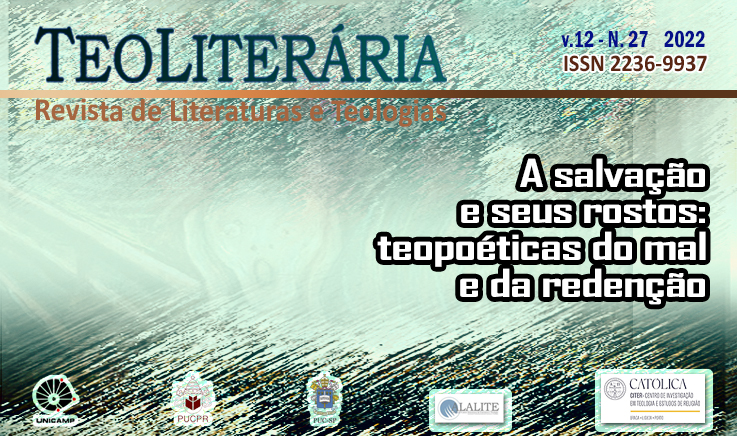Transpositions of the event
Fatima-Bogotá. Rewritings of the Fatima message in a Colombian case
DOI:
https://doi.org/10.23925/2236-9937.2022v27p274-296Keywords:
mariophania, transposition, figure, messianic time, revolutionAbstract
This paper offers a comparative reading from the theory and literary criticism, articulated with the concept of figura developed by Erich Auerbach, which works in the typological sense, in the transposition that we propose between two mariophanias: the Fatima event (1917) as figure of the apparitions to three visionaries in Bogota (1989). The case is construed from an oral narrative that rewrites the message of Fatima in the vital experience of the Colombian seers. This relationship strains the conception of time and history, that we will think from a Benjaminian hermeneutics, as a constellation. We will present the problems involved in thinking the epiphanic event —with fragments of the textual material of the apparitions— using categories such as messianic time developed by Giorgio Agamben, the relationship between promise and consummation from the Pauline hos me (constellation between past and the future), the irruption of the event (plasmatic metaphor) in the religious (messianism) and the secular paradigm (revolt and revolution), and the political dimension that subsists directly in the content of the message of Fatima and the different hermeneutics of the world (christianity, capitalism, marxism) governed by the vital experience of modernity: the revolutionary becoming.
References
AGAMBEN, Giorgio. El tiempo que resta. Comentario a la carta a los Romanos. Madrid: Trotta, 2006.
AGAMBEN, Giorgio. Homo sacer. El poder soberano y la nuda vida, Valencia: Pre-Textos, 2003.
ALTHUSSER, Louis. Ideología y aparatos ideológicos de Estado. Buenos Aires: Nueva Visión, 1984.
AUERBACH, Erich. Figura. Madrid: Trotta, 1998.
AUERBACH, Erich. “Filología de la Literatura Mundial (Weltliteratur)”, Cuesta Abad, José Manuel y Jiménez Heffernan, Julián (eds.), en Teorías literarias del siglo XX. Una antología. Madrid: Akal, 2005.
BADIOU, Alain. El siglo. Buenos Aires: Manantial, 2005.
BARTHAS, C. La Virgen de Fátima. Madrid: Ediciones Rialp, 2009.
BENJAMIN, Walter. Sobre el concepto de historia, en Obras, tomo I, 2. Madrid: Abada Editores, 2008: 303-318.
Biblia de Jerusalén. Bilbao: Descleé De Brouwer, 1998.
BORGES, Jorge Luis. Obras Completas I. Buenos Aires: Emecé, 2009.
BORGES, Jorge Luis. Obras Completas IV. Buenos Aires: Emecé, 2010.
BUCK-MORSS, Susan. Mundo soñado y catástrofe. La desaparición de la utopía de masas en el Este y el Oeste. Madrid: Antonio Machado Libros/ La balsa de la medusa, 2004.
DELEUZE, Gilles. L’Abécédaire, traducción de Raúl Sánchez Cedillo, Vidéo Éd. Montparnasse, 1996
JESI, Furio. Spartakus. Simbología de la revuelta. Buenos Aires: Adriana Hidalgo, 2014.
HOBSBAWM, Eric. Historia del siglo XX. Madrid: Taurus, 1998.
LÖWY, Michael. Redención y utopía. El judaísmo libertario en Europa central.
Un estudio de afinidad electiva. Buenos Aires: El cielo por asalto, 1997.
MARX, Karl, ENGELS, Friedrich. Manifiesto comunista. Buenos Aires: Herramienta, 2008.
MEIER, John P. Un judío marginal. Nueva visión del Jesús histórico. Tomo 1: Las raíces del problema y la persona. Pamplona: Editorial Verbo Divino, 1997.
Memorias de la Hermana Lucía, vol. I, 10.ª ed., Fátima: Secretariado dos Pastorinhos, 2008.
PHILIPON, M. M. La doctrina espiritual de Sor Isabel de la Trinidad. Bilbao: Desclée De Brouwer, 1965.
VALLEJO, César. Rusia en 1931: Reflexiones al pie del Kremlin. Lima: Editorial Perú Nuevo, 1959.
VEDDA, Miguel. “Prólogo”, en Manifiesto comunista. Buenos Aires: Herramienta, 2008: 9-18.
VON BALTHASAR, Hans Urs. Si no os hacéis como este Niño. Rafaela: Fundación San Juan, 2006.
WEBER, Max. La ética protestante y el «espíritu» del capitalismo, Madrid: Alianza Editorial, 2004.
ZAMORA, José Antonio. «Mesianismo y escatología: la resurrección política de Pablo», en Iglesia Viva nº 241, enero-marzo. Valencia, 2010: 71-110.
Published
How to Cite
Issue
Section
License
Copyright (c) 2022 Teoliteraria - Journal of Literatures and Theologies (On Line) ISSN 2236-9937

This work is licensed under a Creative Commons Attribution 4.0 International License.
TeoLiteraria – Journal of Literatures and Theologies owns the copyright of all published material. The whole reproduction of the articles of this Journal in other publications or for any other purpose, by any means, requires a written permission of the editor of this journal. Partial reproductions of articles (abstracts, more than 500 words text, tables, figures and other illustrations) must have a permission written by the publisher and the authors.

